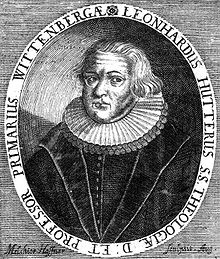Leonhard Hutter: Difference between revisions
m TypoScan Project, typos fixed: latinized → Latinized using AWB |
m Added the {{Authority control}} template with VIAF number 22152397: http://viaf.org/viaf/22152397 . Please report any errors. |
||
| Line 16: | Line 16: | ||
{{Lutheran Orthodoxy}} |
{{Lutheran Orthodoxy}} |
||
{{Authority control|VIAF=22152397}} |
|||
{{Persondata <!-- Metadata: see [[Wikipedia:Persondata]]. --> |
{{Persondata <!-- Metadata: see [[Wikipedia:Persondata]]. --> |
||
| NAME = Hutter, Leonhard |
| NAME = Hutter, Leonhard |
||
Revision as of 20:42, 20 November 2012

Leonhard Hutter (also Hütter, Latinized as Hutterus; January 19, 1563 – October 23, 1616) was a German Lutheran theologian.
Leben
He was born at Nellingen near Ulm. From 1581 he studied at the universities of Strasbourg, Leipzig, Heidelberg and Jena. In 1594 he began to give theological lectures at Jena, and in 1596 accepted a call as professor of theology at Wittenberg, where he died twenty years later.
Works
Hutter was a stern champion of Lutheran orthodoxy, as set down in the confessions and embodied in his own Compendium locorum theologicorum (1610; reprinted 1863), being so faithful to his master as to win the title of "Luther redonatus."
In reply to Rudolf Hospinian's Concordia discors (1607), he wrote a work, rich in historical material but one-sided in its argument, Concordia concors (1614), defending the formula of Concord, which he regarded as inspired. His Irenicum vere christianum is directed against David Pareus (1548–1622), professor primarius at Heidelberg, who in Irenicum sive de unione et synodo Evangelicorum (1614) had pleaded for a reconciliation of Lutheranism and Calvinism; his Calvinista aulopoliticus (1610) was written against the "damnable Calvinism" which was becoming prevalent in Holstein and Brandenburg. Another work, based on the Formula of Concord, was entitled Loci communes theologici.
References
- This article incorporates text from a publication now in the public domain: Chisholm, Hugh, ed. (1911). Encyclopædia Britannica (11th ed.). Cambridge University Press.
{{cite encyclopedia}}: Missing or empty|title=(help); Unknown parameter|wikisource=ignored (help) - Gilman, D. C.; Peck, H. T.; Colby, F. M., eds. (1905). New International Encyclopedia (1st ed.). New York: Dodd, Mead.
{{cite encyclopedia}}: Missing or empty|title=(help)
